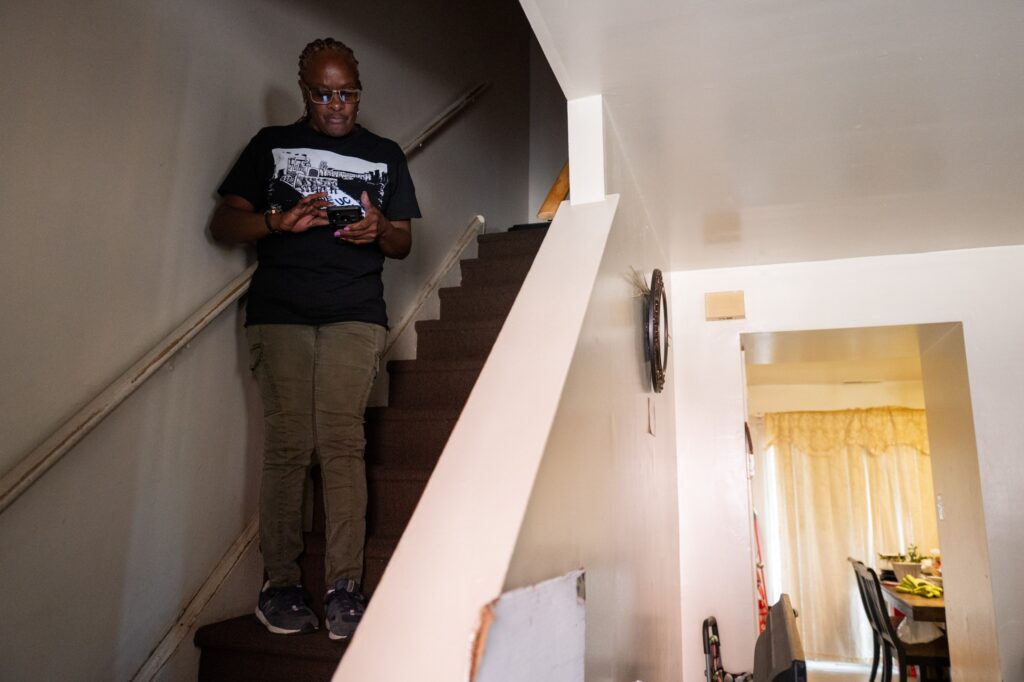The battle ended with residents moving out, but there is a glimmer of hope they will return someday.
by Eden MacDougall

For over a year University City Townhomes residents fought to stop the demolition and sale of their affordable housing complex in gentrified West Philadelphia. They tried everything from marching on City Hall to a tent encampment.
And there was a recent victory of sorts. As part of a March 17th settlement with the city, IBID Associates, the property owner, will be allowed to demolish, transform and sell part of UC Townhomes. But a half-acre of the 2.6 acre property will be developed by the city into 70 permanently affordable units and community green space, according to a City Council statement.
“Had we not fought back, we would likely have received zero percent of this site for affordable housing,” said Sheldon Davids, an activist, at a press conference on April 21.
But Davids, like the 68 mostly Black and Hispanic families, many who have lived there for decades, moved out. All remaining residents have to be out by August 15. It’s unclear when and if they will ever return. The property is for sale.

“While residents see this weak settlement agreement as falling short of addressing our individual needs and the lack of deeply affordable housing, this is just another beginning,” said resident Darlene Foreman, who’s lived at UC Townhomes for over 28 years.
UC Townhomes, located at Market Street near 39th, sits at the intersection of two major universities. The neighborhood is an academic hub filled with cafes and restaurants. Known as University City, visitors and tourists flock to the neighborhood to view art and experience dance, theater and music performances.

Residents have been fighting to keep their homes since February 2022 after IBID decided not to renew its affordable housing contract with the Department of Housing and Urban Development in July 2021. The eviction date was originally set for July 8, 2022, but has been pushed back several times, giving residents time to find new housing. But many longtime residents fought to stay.
IBID is pleased with the settlement and feels it balances residents’ and IBID’s needs, IBID wrote in a statement.
“Nearly three years later, the settlement agreement provides a framework to redevelop the property and reaffirms our commitment to treat the residents with fairness, dignity and respect,” IBID wrote in a statement.
IBID Associates wants to sell the property to a developer who would convert it into a research, development and life-sciences complex or a luxury housing center.
“New affordable housing is not being built fast enough to keep up with increasing demand, putting an even greater strain on the rental market,” Councilmember Jamie Gauthier wrote in an email.
In 2022 IBID filed a lawsuit against Gauthier and the city claiming their attempt to block the sale of UC Townhomes violated their constitutional rights.
“Once we passed the legislation through council they immediately sued me as an individual, as a council person and the City of Philadelphia in federal court and we were fighting them for another year in court,” Gauthier said.
A NEIGHBORHOOD IN FLUX
Lynn Green grew up in University City which was once known as the Black Bottom, a Black working-class neighborhood. The low rents attracted African Americans and migrants. But as the University of Pennsylvania, Drexel University, and Presbyterian Hospital grew, so did the tension. The institutions wanted redevelopment and new schools for their faculty and staff. What was known as the Black Bottom was razed in the 1960s. University City, a gleaming cultural and educational hub slowly replaced it and what remained of the old neighborhood.

IBID Associates bought the property in 1982 for $1, according to city records. Philadelphia sometimes sold properties for a dollar to affordable housing providers and others who wanted to revive “blighted” areas, the Inquirer reported.
There were 429 homes near what became Penn’s Science Center but 10 years later, the census recorded only 15 dwellings in the area and most residents, who were Black, were displaced, according to Penn’s archives, written by MacKenzie Carlson.

According to Carlson, Penn established a commission, which revised its redevelopment plan to include 400 new low-income housing units to replace ones demolished during redevelopment. One of the locations for the replacement housing is the current location of UC Townhomes. The UC Townhomes project was approved in February 1970, but wasn’t built until 1983.
Neighborhood changes came in steady waves.

At first, Green enjoyed the new restaurants and stores opening up but her mother warned her she wouldn’t be able to keep living in the neighborhood. After that, Green noticed how the older stores she shopped at before were disappearing and the new ones “didn’t feel right” but didn’t think she’d have to leave.
“Well July 8, 2021, I was absolutely wrong and my mother was right,” she said. Green lived in the Townhomes for roughly 27 years.
Green moved into an apartment in another West Philadelphia neighborhood in early April.
She said the whole ordeal has been traumatizing. Green misses her former community and the sense of safety it gave her.
“People don’t realize how this plays on your psyche and what it really does to you,” she said.
RESIDENTS’ FEARS AND WORRIES
When IBID informed residents they would not renew their affordable housing contract with HUD, they were shocked, upset and angry.
“I was angry because I couldn’t understand why they’d want to sell this property with 68 families on it, so I was upset,” Foreman said in a July 2022 interview.

After the decision to not renew the HUD contract, the residents received their housing vouchers from Philadelphia Housing Authority in June of 2022, giving them two months to try and find new homes, former resident Green said.
The Housing Choice Voucher Program lets families find their own homes, with the government subsidizing part of the rent and the tenants paying the rest, according to HUD’s website.
Finding housing with the vouchers is hard because landlords don’t want to accept vouchers, Green said. Her options were further limited because she needed pet-friendly housing and to be within walking distance of a drugstore so she can pick up her medicine.
The vouchers list the different rent prices the voucher would cover per zip code, ranging from a little over $850 to $1,100 for a one-bedroom apartment depending on what part of the city the lease is in. But given how high rent can be, it’s not enough, said Amirah Brown, who lived at UC Townhomes for 19 years.
The average rent for a one-bedroom apartment in Philadelphia is $1,829 and $2,095 for a two-bedroom apartment, according to Rent.com
“Homelessness is really what we’re fearful of if they go along with the sale,” Brown said in July 2022.
There are 40,000 people on the closed waitlist for PHA housing according to PHA’s website.
“They tell us about housing but there is no housing,” Foreman said in a July 2022 interview. “When we go on the website, they tell us to go look at this list on PHA.gov, there is no housing.”
IBID representatives said they met with residents and were working with them to help residents find new housing and address other concerns, IBID spokesman Kevin Feeley, wrote in a November 2022 email.
None of the residents interviewed mentioned IBID helping them move and it’s unclear if any others were helped.
Residents held their first action, a rally on Penn’s campus, in February 2022, and continued protesting throughout the year. Their fight for housing escalated when residents set up a tent encampment on the corner of 40th and Market streets in July 2022.
For weeks, residents and supporters sat under two white canopy tents flanking the UC Townhomes entrance, handing out flyers and pamphlets about gentrification and the history of the Black Bottom, now known as University City.
The tents were a visual sign of resistance and remained until August 8, when police took them down and clashed with residents and supporters following a court ruling that the tents, which supporters had been sleeping in, counted as trespassing and had to be removed.
The police arrived around 9:00 a.m. to immediate resistance. Supporters locked arms in front of the townhome’s entrance, forming a human chain to keep the police out. After a few minutes, officers started hopping the wood fence residents and supporters constructed as part of the encampment and forced their way through the human chain and began taking tents down.
The police’s actions were disgraceful and uncalled for, Green said in an August 2022 interview.
“Them coming in and ripping up the tents, and looking at the anger on their faces, it was just horrifying,” Green said.
Protestors started marching through West Philly and Penn’s campus around 10:15 a.m., stopping to block intersections and deliver speeches before circling back to UC Townhomes around 11:40 a.m.

Even though things weren’t going their way, residents couldn’t give up because the stakes were too high.
“We’re not against people making their money, that’s not what it is. But what we are against is you displacing low-income families who work to build the community and help run this city,” said Rasheda Alexander in an August 2022 interview.
Since then residents have won several small victories. The eviction date was pushed back multiple times. Labor unions and faith leaders backed their cause and they met with Secretary of HUD Marcia Fudge in late October.
“One thing through this whole process, the residents here have gotten closer,” Foreman said. “You know, we formed a bond. We always had a bond anyway, but we formed a greater bond, you know.“
SOLIDARITY FROM STUDENTS
Student activists from the University of Pennsylvania and Drexel University supported UC Townhomes residents last summer and fall and called out their universities for gentrifying the area.
Fossil Free Penn, a student climate justice organization, set up their own tent encampment in front of the Van Pelt-Dietrich Library Center from Sept. 14 to Oct. 24 to support residents and pressure Penn president Liz Magill to use part of Penn’s endowment to purchase and preserve UC Townhomes as affordable housing.

Students are guests in West Philadelphia and it’s not right to benefit from the suffering and displacement of actual residents, said Omar Elsakhawy, an FFP member, in a September 2022 interview.
“We fund this school and have a responsibility to speak out against the things that we’re funding, especially things like gentrification,” Elsakhawy said.

FFP also hosted rallies, marched and disrupted university events to protest the sale after ending their encampment.
Penn professor Akira Drake Rodriguez spoke at an FFP rally in late October, criticizing Penn for gentrifying West Philadelphia and reiterating the demand for Penn to purchase and preserve UC Townhomes as affordable housing.
“Families in Philadelphia, like mine, have lived here for multiple generations and it makes no sense to push people out,” said Rodriguez, an assistant professor at the Weitzman School of Design.
AFFORDABLE HOUSING CRISIS
There are over 100 affordable housing units whose contracts will be up for renewal in the next few years.
City Council passed the People’s Preservation Package on May 4 to prevent another UC Townhomes saga, Gauthier said in a May 2023 interview.
If signed into law, it will prevent affordable housing providers from selling their property before giving the city, other affordable housing providers and tenant organizations a chance to purchase the property.

Foreman said she has been reaching out to residents of properties whose contracts will be up so they will be prepared if their property owners don’t renew.
“Every time I turn around, somewhere in this city they’re breaking up a community,” she said. “And it’s time to stop.”


